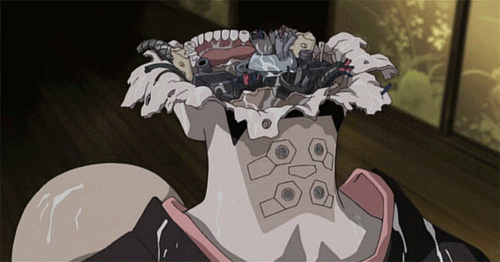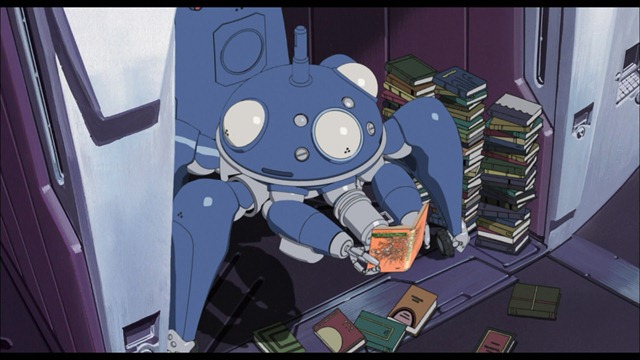| Major Motoko Kusanagi with a Tachikoma in the background. |
"People don't want to believe that technology is broken. Pharmaceuticals, robotics, artificial intelligence, nanotechnology - all these areas where the progress has been a lot more limited than people think, and the question is why." ~Peter Theil
Ghost in the Shell was one of those titles I started back when the dubs were released on [adult swim]. I never really got around to finishing it (not that I would have even been able to comprehend it at the time). The anime has aged well and certainly earned its reputation, but isn't exactly the action-packed thriller it's chalked up to be by some. Rather, it uses a great deal of dialogue, incorporating more thematically diverse material than I've ever seen before.
SYNOPSIS
In the year 2030, technology has advanced to the point where prosthetic parts can replace just about any organ in the body, effectively turning most humans into cyborgs. Androids are near indistinguishable from humans, save for their rather robotic nature. Artificial intelligence can replicate human behavior that the lines between man and machine are blurred. Section 9, an anti-crime unit of Public Security, is a secret task force of elite, cyborg commandos who are given the toughest jobs that the police simply cannot handle.
Years before, an incident starring a mysterious gunman held the head of Serano Genomics at gunpoint. This became known as "The Laughing Man" case, which went cold after he escaped the public eye. Treated as a hero, this master hacker's logo became the face of companies everywhere. Other "Laughing Man" events followed, such as corporate blackmail and ominous deaths. The team of special investigators at Section 9 begin unraveling the mystery through seemingly unrelated cases revolving around the reputation he's made for himself.
| The original Laughing Man incident. |
Stand Alone Complex makes use of every single one of those words. You have "standalone" episodes, which are part of the usual, day-to-day routine of Section 9. These episodes have little to do with the main plot line and occur far more often than not. Occasionally, streaks of "complex" episodes appear, which are related to "The Laughing Man." This format works surprisingly well given the nature of the show. Despite being hard to follow at times, it allows different themes to be hit in each of the standalone episodes whilst combining the labyrinth of plot twists and action of the complex episodes, making for one hell of a ride.
REVIEW
What makes this anime stand out from other titles are the sheer number of themes and their beautiful execution. I don't believe I've seen an anime that covers so many real-world, near-future issues before. Ghost in the Shell primarily focuses on the line between man and machine. What constitutes humanity? When do you lose it (say, when the human body is replaced? The brain?)? What about artificial intelligence? If they resemble humans, acquire individuality, and have a personality, memories, and an ability to understand abstract human concepts (such as life, death, etc. but in terms they can comprehend), are they conscious (hence the use of the word "ghost," for a conscious in a prosthetic body)? Ghost in the Shell poses many of these deep questions and more on its stand alone episodes and leaves viewers to interpret them as they will.
Complex episodes are not spared from thematic usage either. Themes here challenge the morals of viewers as they watch the show blend the writings of J.D. Salinger (most prominently The Catcher in the Rye and "The Laughing Man"), who is known for utilizing themes of immaturity and youth, with the effects of the political underground as well as corporate greed and personal pride. These also question the humanity of characters for their choices and lack of accountability. All themes in Ghost in the Shell are executed beautifully.
| Well shit. |
Read more about Ghost in the Shell Philosophy here (SPOILER WARNING).
I had only one problem with the story - the ending. The crew follows a trail of breadcrumbs to the culprit, who was unfortunately not lead into. This creates a villain that is exceptionally weak, almost nonexistant (almost). This is typical of most shows involving politics. There's always some big fish doing deals in the shadows no one seems to know about until the end. Ghost in the Shell suffers from the lack of a true antagonist with any character whatsoever.
"In theatrical plays, even the audience is a part of the play." ~Togusa
There are also a few logical fallacies found toward the end, which I can't go into detail because this review is spoiler free. So gg, figure it out by watching episode 25.
| A bit gory at times. |
 However, character development is focused on more important characters, from the gang at Section 9 to The Laughing Man. As far as I see it, there are two primary types of character development - characterization (which tells the viewers about the character i.e. Motoko is very militaristic and can come off as scary at times) and character progression (which are changes in character personality/ideals that are incited by events currently happening in the story). Ghost in the Shell utilizes both well, but makes the most out of the former. Certain traits and qualities of characters can be seen from episode one, revealing a few about different characters through the use of back stories or events relevant to each character. It's clear that Motoko runs the show, but other cast members such as Batou and Togusa get their chance to bask in the limelight.
However, character development is focused on more important characters, from the gang at Section 9 to The Laughing Man. As far as I see it, there are two primary types of character development - characterization (which tells the viewers about the character i.e. Motoko is very militaristic and can come off as scary at times) and character progression (which are changes in character personality/ideals that are incited by events currently happening in the story). Ghost in the Shell utilizes both well, but makes the most out of the former. Certain traits and qualities of characters can be seen from episode one, revealing a few about different characters through the use of back stories or events relevant to each character. It's clear that Motoko runs the show, but other cast members such as Batou and Togusa get their chance to bask in the limelight.The Laughing Man was done particularly well though. The vagueness of his existence is in question, making viewers wonder if he's even real. There is solid evidence to prove that he does, but he vanishes without so much as a trace, becoming more of a concept than a character. Still, the show manages to paint him as a brave hero that stood up for his beliefs. The abstract use of questionable events only furthers the mystery behind the man in the jacket as his presence seems to come and go, much like a ghost.
Even the Tachikoma (the spider-looking tanks) are given a good deal of development. A few times, filler episodes are given to them. While not pertaining to Section 9's job, these episodes offer a needed change of pace. They feature the Tachikoma themselves attempting to gather information about their world as to better themselves. These episodes are somewhat comedic in nature and can even attach you to them. Imagine that, being emotionally attached... to a giant robot spider. It is what it is, I suppose. Anyway, it's clear that the Tachikomas become pivotal to the execution of themes in the show regarding what makes a "ghost."
"I thought what I'd do was, I'd pretend I was one of those deaf mutes." ~Laughing Man Logo
If you're that bastard that actually cares about an anime soundtrack, the "oh-my-god-the-OST-is-awful-I-won't-watch-it" type, I can assure you that Stand Alone Complex delivers. You can't really go wrong with Yoko Kanno behind the composition. The intro theme "Inner Universe" by Origa is rather haunting. Intersetingly, Origa is a Russian singer(who has died recently, RIP); an unusual, but welcomed choice seeing how most anime music tends to be Japanese or English. The song is also sung in Russian, English and Latin, a unique mix, to say the least. The ending theme "Lithium Flower" is a rather lighter rock number, which can be mood-breaking at times.
Art and animation, for the most part, have aged well for something that aired starting in 2002. The CGI is the biggest weakness of the series, most notably when 2D characters are animated over the 3D backgrounds, giving it a funny, amateur appearance that oftentimes makes it look like the backgrounds are moving faster than the characters themselves. The animation didn't bother me, but it did seem out of place at times, exposing weaknesses in CGI aging. Another unusual choice was to do the entire intro in CGI, making it look like you're watching a trailer for the next installment of "Mirror's Edge" instead of Ghost in the Shell. Whatever. It did make it hard to forget.
 |
| Tachikoma's even develop human-like habits, such as reading. |
OVERVIEW
"The mark of the immature man is that he wants to die nobly for a cause, while the mark of the mature man is that he wants to live humbly for one." ~Motoko Kusanagi
Ever since the original Ghost in the Shell came out, the series gained its reputation, putting it down in the books as a classic. Production I.G. does the series justice with the Stand Alone Complex series. The writers deserve a big hand here; they made this anime what it is. From its memorable lessons to its captivating cast of characters, Ghost in the Shell: Stand Alone Complex has earned my seal of approval. I still have one more season to watch, so expect a review of that sometime in the near-future.
Narrative: 7.80/10 (x3)
Characters: 9.20/10 (x2)
Aesthetics: 6.50/10 (x1)
Execution: 9.00/10 (x2)
Value: 9.00/10 (x2)
Overall: 8.43/10 (92.15% A+) "Great, if you can comprehend it."
Nice, maybe I'll get around to watching this once I finish hajime no ippo.
ReplyDelete